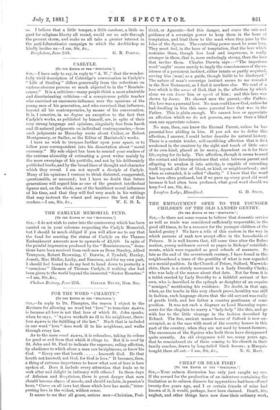THE EMPLOYMENT OPEN TO THE YOUNGER CHILDREN OF THE OLD
LANDED GENTRY.
[TO THE EDITOR OF THE " SPEOTATOR."1 SIR,—Is there not some reason to believe that domestic service as well as trade was considered sufficiently respectable, in the good old times, to be a resource for the younger children of the landed gentry ? We have a relic of this custom in the way in which persons of rank now accept office in the households of Princes. It is well known that, till some time after the Refor- mation, young noblemen served as pages in Bishops' establish- ments, which were regarded as good schools of manners. So late as the end of the seventeenth century, I have found in this neighbourhood a trace of the gentility of what is now regarded as a menial position. In the Church of Priors, Salford, Warwick- shire, there is a stately monument to a Lady Dorothy Clarke, who was lady of the manor about that date. Not far from it is a tablet erected by Lady Dorothy to a faithful servant of her own, who is described in the epitaph as daughter of an esquire " armiger," mentioning his residence. No doubt, in that age, when, as the tombs in this very church prove, heraldry was still in fashion, such language shows that the old servant was really of gentle birth, and her father a country gentleman of some position. It was not such a disgrace as Lord Macaulay repre- sents for the chaplain to marry a " lady-help " like this, and go with her to the little vicarage in the fashion described by Echard. The fine, ancient manor-house of Salford is now un- occupied, as is the case with most of the country houses in this part of the country, when they are not used by tenant-farmers. The successors of the Squires who built them have disappeared quite recently. An old clergyman told me, many years ago, that he remembered six of them coming to his church in their family coaches, drawn by long-tailed black horses ; a Marquis
bought them all out.—I am, Sir, &c., N. G. BATT.


































 Previous page
Previous page